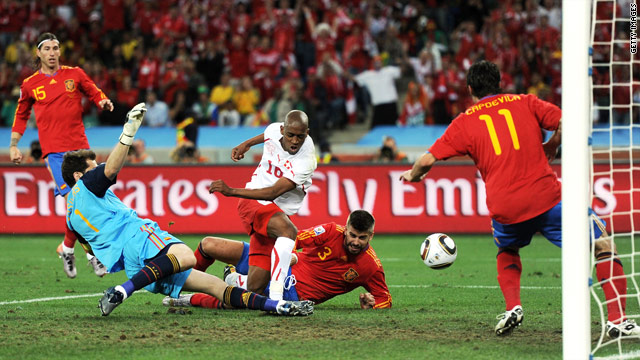
On the whole Terry Eagleton’s opinion piece on football is quite sensible, sketching out how the beautiful game functions in our capitalist societies. It stumbles at the end though, as he slips in the necessity of abolishing it if we want to be “serious about political change”:
If the Cameron government is bad news for those seeking radical change, the World Cup is even worse. It reminds us of what is still likely to hold back such change long after the coalition is dead. If every rightwing thinktank came up with a scheme to distract the populace from political injustice and compensate them for lives of hard labour, the solution in each case would be the same: football. No finer way of resolving the problems of capitalism has been dreamed up, bar socialism. And in the tussle between them, football is several light years ahead.
[…]
With football, by contrast, there can be outbreaks of angry populism, as supporters revolt against the corporate fat cats who muscle in on their clubs; but for the most part football these days is the opium of the people, not to speak of their crack cocaine. Its icon is the impeccably Tory, slavishly conformist Beckham. The Reds are no longer the Bolsheviks. Nobody serious about political change can shirk the fact that the game has to be abolished. And any political outfit that tried it on would have about as much chance of power as the chief executive of BP has in taking over from Oprah Winfrey.
Football serves as a safety valve, as something that gives meaning and a common purpose to the lives of countless people in a society where so many other communal ties have been deliberately broken. In that sense Eagleton is correct to see it as something that helps prop up capitalism, a modern variant of Rome’s panem et circenses. But he’s wrong to therefore assuime that football needs to disappear before a revolution is possible. That’s just confusing a symptom for the disease. In our hypercapitalist world anything and everything is co-opted and used by capitalism for its own ends. It’s therefore easy to, as Eagleton does here, confuse the trees for the forest. The problem isn’t that football has been co-opted, but that there is a capitalist system to do so.
Which doesn’t mean that we should just accept capitalism’s influence on football (or other sports), but that if we want to fight this influence, we have to do so because of the love for the game itself, not out of some abstract desire for a world revolution. Because that trick never works.
ejh
June 17, 2010 at 3:51 amI’ve never much liked this opiate-of-the-people view of the game anyway. Let’s suppose that it did disappear tomorrow. Does that mean that the people who watch it would suddenly become involved in political activity? There are still plenty of thinks of that sort to do already if it was what they wanted.
Martin Wisse
June 18, 2010 at 7:11 amExactly. Also, it’s not as if football and activism are incompatible; plenty people do both.